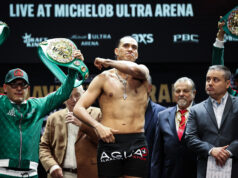There was “Trancazos” on Friday night. He waved to an Arizona crowd that didn’t much respond to his post-fight salute. He applauded his victorious opponent. He held the other man’s glove aloft and nodded. He raised his own taped fist when he thought a photographer asked for it. Then his opponent went off to celebrate, and “Trancazos” stood there, guileless as ever, awaiting his corner’s instructions.
It brought some memories that turned the nostalgia crank with old teeth I’d mistaken for nubs.
There was Mexico City’s Genaro Trazancos, whose nickname, “Trancazos,” was chosen because it means “punches” in Spanish and because, well, can you think of anything that rhymes with Trazancos? He had just lost by convincing knockout to undefeated Filipino Mercito Gesta. He’d been balanced on his stool in center-ring by a doctor. And now he was upright once more and going through an odd ritual of indulging his vanquisher.
Five years and some months ago, I sat in a Days Inn conference room in downtown Phoenix and waited for a Thursday weigh-in to happen. Chance put me in a seat beside Trazancos. A 30-minute conversation ensued, just as soon as Trazancos apologized if his breath smelled bad – as he’d not so much as sipped water in days.
He was in Arizona as an opponent for a touted prospect on Telefutura’s “Solo Boxeo” program that Friday. He had a roundtrip plane ticket he lamented. He’d wanted to stay in Phoenix for another day and buy a truck he could drive back to Mexico. But he didn’t want to waste the ticket. He wanted to know why my credential showed a large picture of Steven Luevano but no picture of him. He really wanted a drink of water. And he was sure he’d win the next night, which of course he would not.
Last Thursday afternoon in Tucson, “Trancazos” was in the same situation, five years later, though I was not, and neither was Arizona. In 2005, Grand Canyon State hosted 15 televised fight cards. In 2010, it needed eight months and 20 days to host its first. Arizona’s economy, as measured by its property values, has not deteriorated at quite that rate. But to its homeowners, you can bet it feels like it has.
And Arizona’s property values are a smart place to look for an explanation of SB 1070, the piece of immigration law that is now a national issue. The entirety of the debate is wrapped in cynicism – a mindset that makes you believe nobody means what he tells you. But Americans’ outrage at illegal immigration is ever related to the economy, not the immigration rate – which has been steadily declining in Arizona since 2007 and HB 2779.
How do Arizonans feel about their new law, which was defanged by U.S. District Court Judge Susan Bolton in July? I can’t say. But here comes a good anecdote for how others in the Southwest feel about it.
I’d been a Texan for almost three months when SB 1070 became law in April. I had no plans to change my cell-phone number from its Phoenix area code. And then, in one week, I had three conversations like this:
“That’s not a local area code. Where is 480 from?”
“Arizona.”
“You mean where they hate Mexicans?”
How do you combat that? I chose flight over fight and changed my phone number.
Promoter Top Rank chose a similar tack in May and canceled plans to host a “Top Rank Live” show in Phoenix, citing disapproval from broadcaster TV Azteca and sponsor Tecate.
And yet, there was Tecate everywhere you looked, Friday. Ring posts, canvas, between-rounds commercials.
Apparently Judge Bolton’s injunctions meant quite a bit to the brewer. Which makes little sense. If Tecate’s refusal to sponsor boxing in Arizona was a principled stand against Arizonans, whose elected congressmen wrote and passed SB 1070, how did a judge’s temporary ruling nullify that? Seems muddled as the immigration debate itself.
So let’s offer a point of clarity for that debate then move on.
A person who enters this country illegally knows the difference between a place where work is and a place where work isn’t. If you are serious about restricting the flow of undocumented immigrants to the United States, go after their employers – yes, the sainted small-businessmen whom politicians court with their inane “lifeblood of the economy” bit. Because if criminal employers are not your first target for immigration reform, you’re a huckster or a cheerleader; you’re not a reformer.
Genaro Trazancos is not a huckster, cheerleader or reformer but a decent man who’s made a passable living in a brutal profession. Five years ago in Phoenix, he got done-in by Steven Luevano, who would go on to win and defend the WBO featherweight title five times before being done-in himself by Juan Manuel Lopez in January and announcing his retirement last week. Best of luck to you, Steven.
“Trancazos” had been promised a big fight if he beat Luevano. He got a bigger fight for losing; nine months later in Japan, he became the first of 18 men to last a full round with the late Edwin Valero.
Friday, he faced Mercito Gesta (19-0-1, 9 KOs) and did so having gone 2-9 in seven years, having been knocked-out seven times in his last 11 fights, and having lost in one round to Mike Dallas Jr. four months ago. He fought in an announced temperature of 104 degrees and lasted till the first minute of the seventh round. Gesta looked spectacular blasting him into unconsciousness. Mission accomplished.
Then “Trancazos” rose from his precautionary medical exam and clapped for Luevano. He had shown no hit-back reflex or savvy, just pride and diminished reflexes. He induced others’ sympathy because he had no idea how pitiful he looked.
If “Trancazos” is ready for his final bow in prizefighting, though, he’s also fine a reminder that goodness can outlast small-minded acrimony.
Bart Barry can be reached at bbarry@15rounds.com










